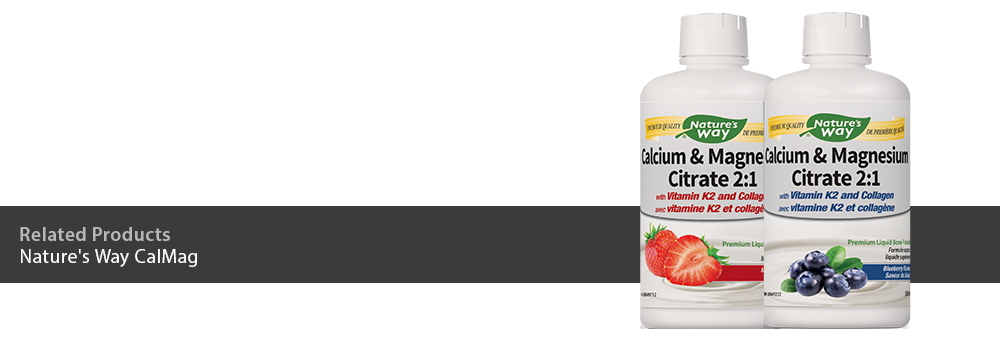

All Ages Need Nutrition for Bone Health
Did you know bone is a living tissue? It is being remodelled all the time, with old bone being reabsorbed and new bone being formed[1]. This happens throughout your lifetime. Interestingly enough, it’s believed that bone mineral density is at its highest between 25 and 35 years of age, which is why bone health is not just important in the elderly but also in the young[1].
It is widely known that getting enough calcium is important for building healthy bones and teeth. This is why health care practitioners will often prescribe calcium supplements to patients who are experiencing, or who are at risk of developing, low bone density which indicates how much calcium and other minerals are present in a section of bone[1].
Our bodies don’t make calcium so maintaining a healthy intake of calcium from dietary sources or supplementation is important to help ensure the maintenance of healthy bone mass. There are a number of factors that affect bone density, age being one of them[1]. Other factors include vitamin D status – it is thought that many people only absorb 10-15 % of the calcium they eat in their diet. Vitamin D, which is a hormone and sometimes referred to as a the “sunshine vitamin” actually helps the gut absorb calcium[1].
Another important mineral when it comes to bone health is Magnesium. It is an abundant mineral that actually works with calcium in that it helps it get in and out if cells[2]. Magnesium is a co-factor for over 300 enzymatic systems [2]. When it comes to our bones it plays a role in bone formation, in fact 50-60% of the magnesium in our body is found in our bones[2]
While calcium, vitamin D and magnesium have gone hand in hand for many years when it comes to bone health, another interesting nutrient when it comes to bone health is vitamin K. Like vitamin D, vitamin K is a fat soluble vitamin and refers to a group of compounds that include vitamin K1 and vitamin K2.[3]Vitamin K is believed to play a role (as a co-factor) in bone mineralization and turnover[3].
How can you increase your intake of these nutrients?
Dietary sources of magnesium include a wide variety of plant based foods such as vegetables, legumes, nuts and seeds as well as meats such as chicken[2]. Calcium can be found in dairy based products such as milk, cheese and yogurt as well as vegetables like kale and broccoli – to name a few[4]. Vitamin K on the other hand can be found in dietary sources such as green leafy vegetables and some fruit, which are a primary source of vitamin K1, while vitamin K2 is found in fermented foods, cheese or meats as well as being produced by bacteria in the gut [3].
All of these nutrients are also available combined in a natural health product supplement form. Choosing a supplement such as the liquid Nature’s Way Calcium & Magnesium Citrate 2:1 product can be an easy (just one tablespoon a day!) choice that tastes great with flavours including blueberry, orange and strawberry. Nature’s Way Cal Mag not only includes a 2:1 ratio of calcium and magnesium but also includes vitamin D3, hydrolyzed collagen, manganese, and boron. Available with and without vitamin K depending on your needs.
There are a variety of ways to keep your bones strong from the diet as well as supplements – as always, consult your health care practitioner before taking any natural health product or dietary supplement.
1. Wisse, B. Calcium and bones. 2016 [cited 2017 May 3rd ]; Available from: https://medlineplus.gov/ency/article/002062.htm.
2. NIH. Magnesium – Fact Sheet for Health Professionals. 2016 [cited 2017 May 30th 2017]; Available from: https://ods.od.nih.gov/factsheets/Magnesium-HealthProfessional/.
3. NIH. Vitamin K – Fact sheet for Health Professionals. 2016 [cited 2017 May 2nd 2017]; Available from: https://ods.od.nih.gov/factsheets/VitaminK-HealthProfessional/.
4. NIH. Calcium 2016 [cited 2017 May 30 ]; Available from: https://ods.od.nih.gov/factsheets/Calcium-HealthProfessional/.

